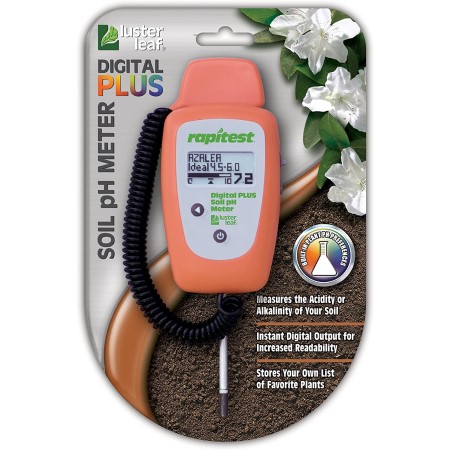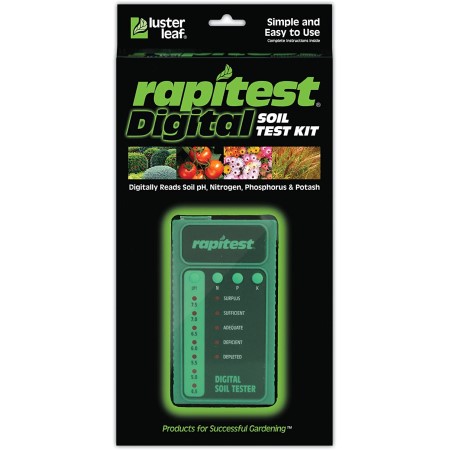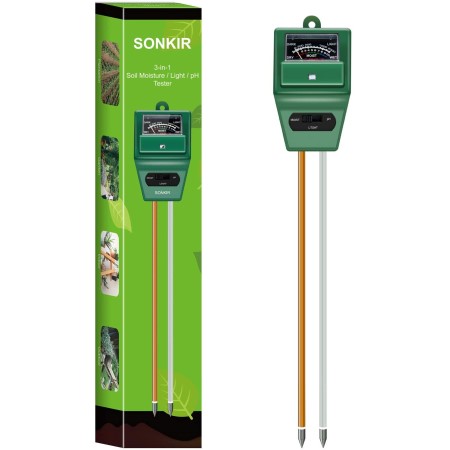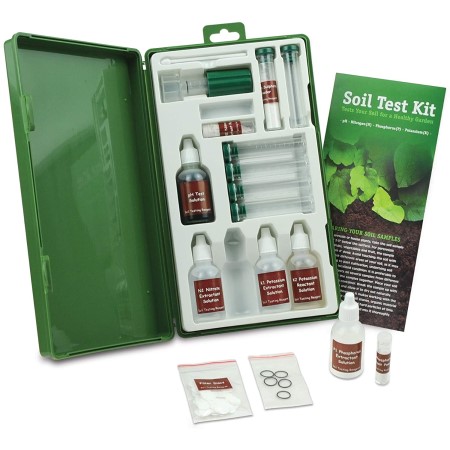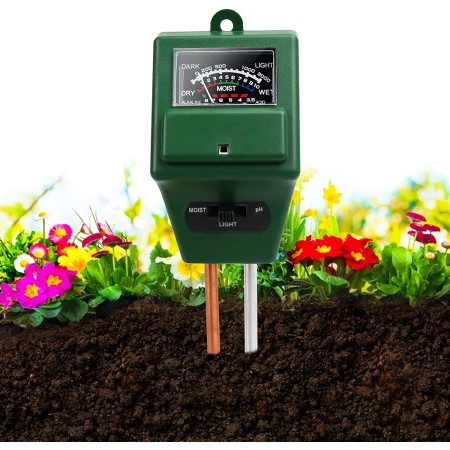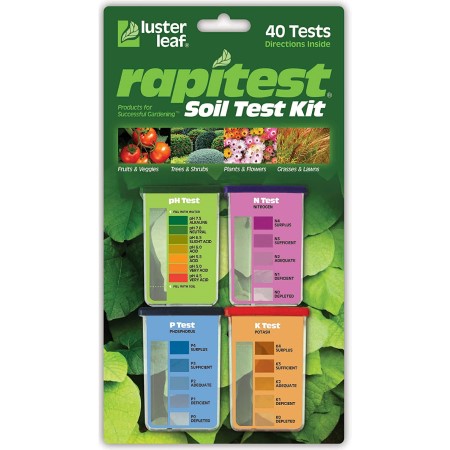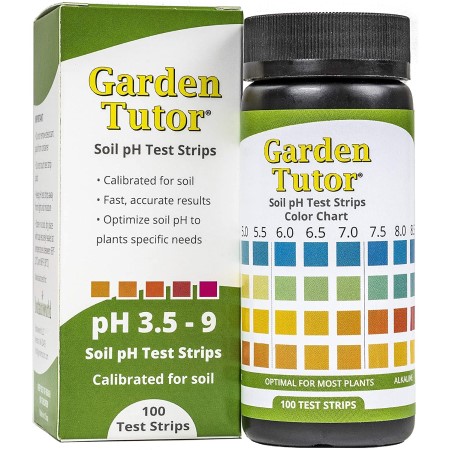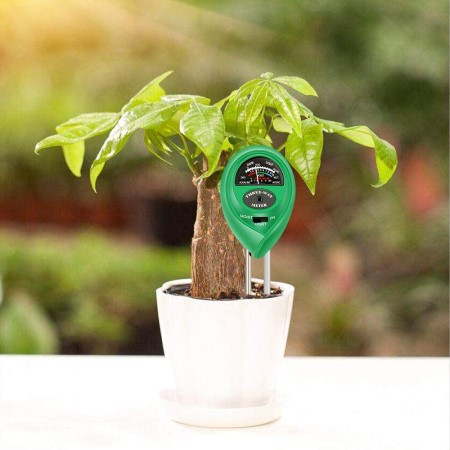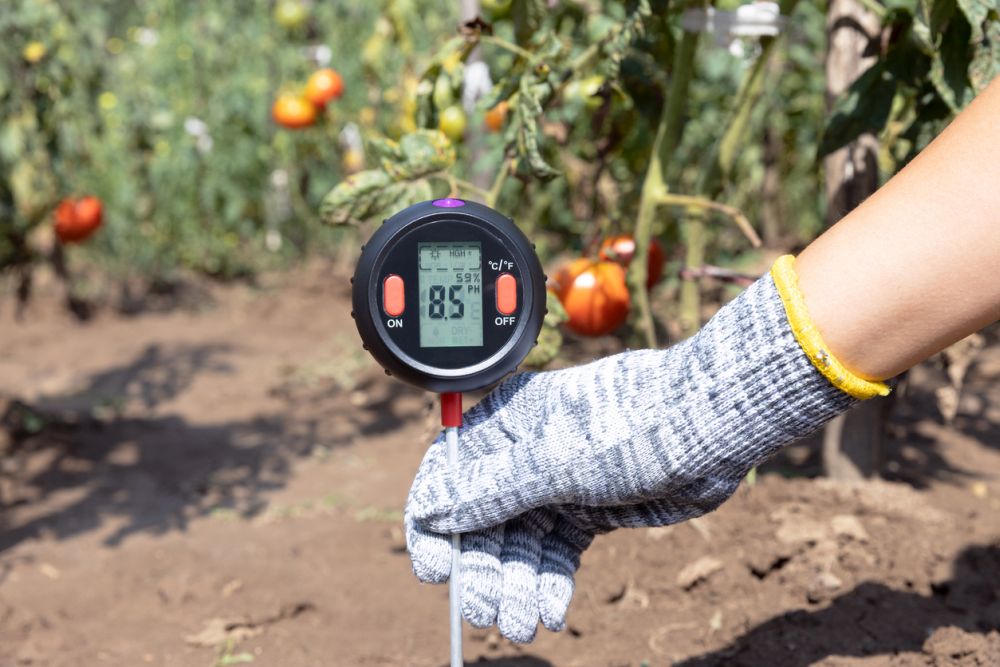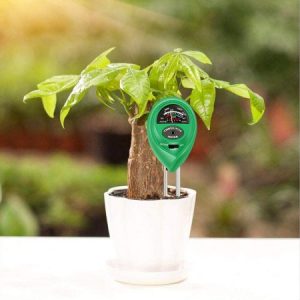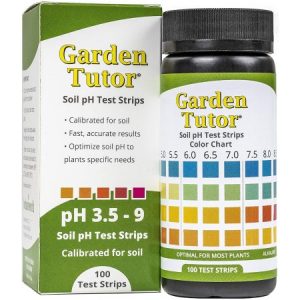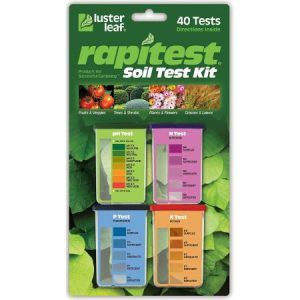The 8 Best Soil Test Kits You Can Get in 2023
A soil test kit is not just for the avid gardener with a very green thumb who keeps a lively garden bustling with life. It’s also for the homeowner with a yard that doesn’t seem to sprout anything, not even grass. Soil structures are as complex and varied as they come.
Clay soil for example is heavy, dense, and with low tilth quality. And that’s completely different from the pH levels and chemical structures of the soil itself. All of these aspects of the soil in your garden or yard impact the growth and success of any green thing you plant in it. So how do you know how good or bad the soil in your garden is? There’s where a soil test kit comes in.
The best soil test kit gives you accurate information about pH levels, the chemical structure of the soil, and its drainage grade among other information. We tested some of the most popular and top-quality soil test kits in the market and compiled these reviews and buying guide for you.
Best Soil Test Kit Reviews
The best soil test kit is not just about giving you numbers and data. It’s also about putting these numbers in context to give you a clear and comprehensive picture of the state of the soil in your yard or garden. Here are the top eight soil test kits in the market reviewed and tested for your gardening pleasure.
1. Editor’s Choice: Atree Soil pH Meter, 3-in-1 Soil Tester Kits
Convenient, easy to use, and versatile, the Atree Soil pH Meter, 3-in-1 Soil Tester Kits is a multipurpose tester kit that doesn’t require much preparation or fuss. The one-piece kit is portable and gives quick readings of the moisture and pH levels in the soil.
By convenience we mean the soil tester doesn’t use chemicals, vials, or even batteries. You simply insert the two probes into the soil and watch the dials give you accurate readings. You can use it to measure not just the pH and moisture in the soil but also the sunlight intensity in a certain spot in your garden. All of these three factors are crucial for the success of many plants.
Since it doesn’t need batteries, the whole kit has an analog design. Two probes come out of the body of the kit. They end up with sensitive tips that detect changes in the moisture and pH levels in the soil. The conductors transmit these changes and reflect them in the dials.
Unlike chemical-based kits, you don’t have to go through a multi-step process to get the results you want. Moreover, the convenience of the Atree kit allows you to monitor the soil in a certain area in your garden for any improvements or soil degradation. This helps you decide where to grow certain sensitive plants or whether that spot is suitable for veggies, flowering plants, or shrubs.
The main disadvantage of this soil test kit is that it doesn’t test the chemical structure of the soil. It doesn’t tell you if the soil needs more or less fertilizer or how much nitrogen or potassium is in the soil. Also, the probes need to be sanded down since the build-up of grime and dirt diminishes their sensitivity.
Pros
- A 3-in-1 kit that tests moisture, pH, and sun intensity.
- No batteries required.
- Convenient and compact.
- Easy to use and shows results fast.
- A one-step testing process with no chemicals involved.
Cons
- Doesn’t test the chemical structures of the soil.
- Probes need to be polished regularly.
2. Best Budget: Garden Tutor Soil pH Test Strips Kit
The accuracy of the results of pH tests is in doubt especially if the soil test kit is one of those “universal” kits. If you want to get accurate pH readings every time you test the soil, then you’ll need a specialized kit designed just for that purpose. That’s what Garden Tutor Soil pH Test Strips Kit is for. It has a singular purpose and that is to test the pH of the soil and give you accurate results every time you use it.
Since this is a chemical test kit, that means the testing process is a multi-step one. The Garden Tutor kit itself comes in the form of strips. You’ll need to take a sample of the soil and mix it with water. Shake the vial well then dip the test strip in it. The strip will change color and you can match the color on the included manual to get the exact pH level of the soil.
The kit has 100 strips in it which is enough to test your garden or yard many times over. That way you can test your garden before planting your perennials to ensure the success of the plants.
On the downside, the color shades can overlap or become hard to distinguish. So you’ll have to guess the exact pH level. This can have huge implications if you plan to grow a plant that requires an exact pH level in the soil.
Pros
- Easy to use.
- Designed specifically to test pH levels in the soil.
- Gives quick readings.
- 100 strips in the package.
- Detailed manual and color chart included.
Cons
- The color differences on the strip are subtle and can be hard to distinguish between color shades.
3. Premium Pick: Luster Leaf 1601 Rapitest Test Kit
A comprehensive soil test kit is one that gives you a thorough reading of the chemical structure of the soil. The Luster Leaf 1601 Rapitest Test Kit does a good job of testing the three main chemicals in the soil along with pH levels.
The kit comes with four packages, one for each element it tests in the soil. This is what makes the Luster Leaf our premium pick. It doesn’t try to test everything in the soil with one kit. These general tests are usually less accurate compared to a specific kit that tests just one element such as nitrogen, potassium, or phosphorus.
The Luster Leaf has 40 capsules in all. Each of the four tests has 10 capsules. The process of testing the soil is quite simple and doesn’t require prior experience or certain skills. After mixing the soil sample with water, you add powder from the capsule and shake it. The color of the solution changes and you can compare it against the color chart. It’s recommended that you write down the results in a note to monitor the soil condition and take action when needed.
Along with the test kit, the package also includes a detailed manual about the soil pH preferences for over 450 plants.
The main problem with this test kit is that you still have to compare color shades against a color chart. This requires you to have a sharp eye for the nuances of color differences. This could lead to inaccurate results or you having to take a guess sometimes.
Pros
- Tests for nitrogen, potassium, and phosphorus along with pH levels.
- 40 capsules included, 10 for each test type.
- Detailed manual about the soil pH preferences for over 450 plants.
- Easy to use and gives quick results.
Cons
- The color comparison can give mixed or less than accurate results.
4. SSAWcasa Soil PH Meter,3-in-1 Soil Test Kit
Not everybody has a keen sense of the 50 shades of pink or orange or whatever color the test strips and capsules come in. If you prefer to perform your soil tests in one step without hassle, adding chemicals or comparing colors, SSAWcasa has got you covered. The SSAWcasa Soil PH Meter,3-in-1 Soil Test Kit is all about sticking the probes in the soil and watching the indicator point to the right reading.
This 3-in-1 soil test kit tests the pH levels, moisture, and light intensity in your garden. Moreover, you can use it both indoors and outdoors. This can come in handy if you also keep houseplants and want to know how healthy the potted soil is.
Once the two probes are between 2 to 4 inches deep into the soil, you can use the switches on the front panel of the test kit to get the reading you prefer. There are three switches for moisture, pH level, and light intensity. The readings are accurate and give you a good idea of which plants are suitable for this specific spot.
The moisture tester is of particular value when you have plants that require certain levels of moisture in the soil. After you water the plants, use the SSAWcasa kit to check if the soil is moist enough for the plant or whether you need to adjust your future watering.
Although the kit doesn’t need batteries and is both portable and convenient, it still has some drawbacks. The most glaring disadvantage is the limited scope of the tests. One of those problems has to do with the copper coating of the yellow probe. It doesn’t last long after many uses and peels off.
Pros
- A 3-in-1 test kit that doesn’t require batteries.
- Tests for moisture, pH levels, and light intensity.
- Can be used indoors and outdoors.
- Convenient switches on the front panel.
Cons
- Limited scope of tests.
- Copper coating of the probe is not durable.
5. Luster Leaf 1663 Professional Soil Test Kit
Luster Leaf is a big name in the soil testing niche and you can expect to see more of their products on this list. One of these kits that excel both in package size and test scope is the Luster Leaf 1663 Professional Soil Test Kit. It’s a chemical-based kit that requires mixing the soil sample with water and adding a few drops of the chemical. When the color of the solution changes, you can compare the color against an included color chart.
One of the advantages of the 1663 test kit is that it tests for the main three nutrients in the soil, namely nitrogen, phosphorus, and potassium. It also tests for pH levels in the soil to give you a clear idea of the condition of the soil.
Overall, the package includes enough material to conduct 80 tests. The plastic casing is sturdy and portable. It also includes the vials you’ll need to perform the chemical tests. And as a bonus, the package includes a detailed manual, a reference for soil pH levels for hundreds of plants, and a few gardening tips.
The main disadvantage with this kit is that the results are generalized at best. They are not by any measure as accurate as the results you get from professional tests conducted in a lab. So you’ll need to keep that in mind when you base your gardening plans on the results of this test. If you have finicky plants with extra sensitivity to soil acidity or nitrogen levels, you might need to perform more than one soil test just to be on the safe side.
Pros
- The package includes 80 tests.
- Tests for nitrogen, phosphorus, potassium, and soil pH.
- Detailed manual included.
- Sturdy plastic casing.
Cons
- Produces generalized test results.
6. Sonkir Soil pH Meter, MS02 3-in-1 Soil Tester
Even if you don’t take gardening seriously and just like to spend a couple of hours every weekend planting and pruning, it’s still worth it to take a scientific and methodical approach to gardening. That means you’ll need a soil tester like Sonkir Soil pH Meter, MS02 3-in-1 Soil Tester that gives you accurate information about the pH levels, moisture, and light conditions in your garden. It also works well both indoors and outdoors.
The Sonkir simply uses two probes to gather all the data it needs from the soil. Just insert it between 2 to 4 inches deep and wait for a few seconds. The dial will point out the exact acidity levels of the soil and how much moisture there is. You can use that information to determine whether the plants need watering or not.
However, for the soil tester to work the soil has to be moist. It doesn’t work on dry soil since the metal probes interact with the moisture in the soil to check the pH levels. So if you insert the probe but the needles don’t budge on the dial, that means you have to water the soil first.
These types of soil testers don’t need batteries so you can use them anytime and anywhere without limitations. However, the two metal probes are rather thin and bend easily. If you have dense or compact soil, you could easily damage the soil tester.
Pros
- Works both indoors and outdoors.
- Tests for pH, moisture, and light.
- Easy to use and requires no batteries.
Cons
- The probes are thin and could bend easily if used in clay or compact soil.
7. Luster Leaf 1605 Digital Soil Test Kit
We have seen so far how chemical testers use color shades to display the results. But these color shades are not easy to distinguish by the naked eye. So Luster Leaf 1605 Digital Soil Test Kit went a step further and decided to decipher the colors for you. This is a digital soil test kit that uses batteries.
The principle is simple. You mix a sample of the soil with water and add the powder from the respective capsule to test for either pH, nitrogen, phosphorus, or potassium. Once the color of the solution changes, slip the vial down the slot in the kit and push a button. The kit uses LED light to distinguish the color of the solution accurately and displays the results in numbers.
Needless to say, this takes the guessing out of the whole equation. You don’t have to squint trying to identify the color of the sample and match it against the color swatch provided. The package includes 25 tests divided as follows, 10 tests for pH levels and 5 tests for each of the three main elements in the soil.
Along with the limited supply of tests, the test capsules are not durable. If left in humid conditions they simply melt. They also seem to have an expiry date, although no such date is specified on each capsule.
Pros
- Digital soil test kit that displays the results in numbers.
- Tests for pH, nitrogen, phosphorus, and potassium.
- LED light technology that defines the color of the tests.
- Guide to amend the soil.
- 25 test capsules included.
Cons
- Limited supply of tests.
- Test capsules have an expiry date although that date is not specified on the capsules.
8. Luster Leaf 1847 Rapitest Digital Plus Soil pH Meter
Another digital Luster Leaf meter brings these best soil test kit reviews to a close. The Luster Leaf 1847 Rapitest Digital Plus Soil pH Meter has only one job and that is to test the pH levels of the soil. However, using advanced technology and two extra sensitive probes, the meter gives more accurate results than other soil test kits on this list.
Before you insert the 1847, you’ll need to clean it first. This removes any oxidization on the surface of the probes and increases their sensitivity and the accuracy of the results. Then water the soil and insert the probes about 4 inches into the soil. After about 60 seconds you’ll get a reading. Remove the probes, wash them then insert them back into the soil. This second test ensures you get an accurate reading. The pH levels will display on the panel.
The kit also includes a booklet of over 450 plants and their favorite pH levels. This makes it easier for you to amend the soil according to the needs of each plant you intend to grow.
That said, the 1847 can only be used in soil and it doesn’t provide any other data regarding the moisture, light, or any of the components of the soil. That basic functionality means it’s only suitable for amateur gardeners.
One problem that we had with this meter has to do with the sealing of the product. It’s not hermetically sealed and if it gets splashed with water, it will not function. You have to wait for it to dry out before it becomes usable again.
Pros
- Advanced technology to detect pH levels in the soil.
- Easy to use.
- Gives fast readings.
- Included booklet of 450 plants and their specific pH levels.
Cons
- The product is not sealed properly and doesn’t function if covered in water.
Best Soil Test Kit Buying Guide
Now that we have covered the best soil test kit reviews, let’s take a more detailed look at the benefits of these kits and the different types of soil testing methods they perform.
Why would you Need a Soil Test Kit?
A soil test kit is more than just a nifty gadget that flashes numbers and figures at you. These tools give you a clear idea of what lies beneath the surface of the soil. Here are some of the benefits of a soil test kit.
- Healthy soil makes it easy for you to grow just about anything plant you want. And the best way to achieve healthy soil is to understand the structure and chemical composition of the soil under your feet.
- With enough information about your soil, you have a good idea about how to fix the problems in the soil without spending too much money trying out different treatments and cures.
- A soil test kit helps you prevent soil degradation which happens to all types of soil as a result of overplanting and not giving the soil enough time to rest.
- This is a cost-effective way to understand the common problems prevalent in urban gardens and how to fix them.
- Avoid overfertilization which can drastically change the chemical structure of the soil and increase its alkalinity or acidity which gives it poor tilth.
Types of Soil
Perhaps the best way to know the right plants to grow in your soil is to understand what type of soil you have in the first place. That saves you a lot of time and money trying out different plants that are just not suited for this type of soil. Here are the main types of soil.
- Clay: A common soil type that is characterized by dense soil particles packed together. This soil tends to become compact easily and has higher water retention that leads to root rot. You need to treat clay soil before you can plant anything in it.
- Sandy: Sandy soil is loose, well-drained, and allows air to infiltrate the layers of the soil easily. However, it tends to absorb moisture too fast and doesn’t hold nutrients for too long. Few plants grow in sandy soil and you need to treat it first.
- Silt: The fine particles of the silt are rich in minerals and nutrients that plants need to grow and thrive. But a soil rich in silt is also compact and dense which makes it difficult for the roots to grow and spread.
- Loamy: Loamy soil is the best-balanced type of soil you can have in your garden. It has the right portions of clay, silt, and sand to make it well-drained, rich, and loose enough for most plants to grow and thrive. When treating any of the above soil types, you always strive to turn them into loamy soil.
Different Soil Testing Methods
When you buy a soil test kit you use it to understand the chemical structure of the soil in your garden. Depending on the kit type, you’ll end up performing any one or more of the following soil testing types.
- Macronutrient Testing: This is the most common soil testing type that you will perform. It tests for the three main minerals in the soil. These are nitrogen (N), phosphorus (P), and potassium (K). Together they form the famous NPK ratio that you see on all fertilizer packages you buy at the store. And while the soil test kit will give you somewhat accurate results for phosphorus and potassium, nitrogen often is more elusive. Nitrogen concentrations vary from one spot to the next in the same garden.
- Micronutrient Testing: Besides those three main elements, the soil is packed with other minerals that some but not all plants need. These include zinc, iron, magnesium, and calcium to name but a few. However, not all soil test kits test for these minerals.
- pH Levels: The pH levels of the soil tell you how acidic or alkaline your soil is. While most plants prefer neutral or slightly acidic soil, alkaline soil is mostly not arable. These tests help you adjust the pH levels in the soil to something closer to 6.0 which is neutral or increase the acidity of the soil to suit the type of plants you want to grow.
Soil Test Kits Types
In order to get accurate details about the structure of the soil, test kits come in different categories based on the type of test they perform. In general, these kits are grouped together into the following types.
- Chemical Kits: These kits provide vials with different color caps. In each vial, you put a sample of the soil and add some water. The color of the water corresponds to the color of the cap and lets you know how much of that nutrient is in the soil.
- Digital Kits: These kits are easier to use than the chemical types and give you more accurate information. You still need to fill a vial with soil and water and shake it well. But then you plunge into the soil test kit to get an accurate reading of the different chemicals in the soil. These kits are often battery-operated.
- Professional Testing: As the name implies, these tests are performed by professionals. You would usually send them a sample of the soil and let them test it and give you the results. The data provided by these tests are the most accurate although they will cost you a lot more than the other two.
Soil Test Kit FAQs
How accurate are soil test kits?
The accuracy of the soil test kit depends on the design and type of testing it performs. Chemical kits for example have higher accuracy than kits that use probes to test the soil. The problem with chemical tests is that they use color shades to display the results which might not be very useful for the average person. Digital kits such as Luster Leaf 1605 Digital Soil Test Kit use LED lights to read the colors and display the results in figures.
How can I lower my pH levels quickly?
The best and fastest way to bring down pH levels in the soil is to introduce aluminum. It dissolves quickly in the soil and brings down the pH levels in a short time. You could also use sulfur for the same purpose. However, sulfur is slow to dissolve and its interaction with the soil depends on moisture and the chemical composition of the soil itself.
Can I test the soil at home for free?
You can test pH levels of the soil using materials already available at home. To test the alkalinity of the soil, mix a sample with water and add vinegar to it. If the solution starts to fizz, then you have alkaline soil. To test for acidity, repeat the same process but use baking soda instead of vinegar. Any chemical interaction that results in bubbles of gas means you have acidic soil. Of course, you can’t tell how acidic or alkaline your soil is with these free tests.
The Last Word
Healthy and rich soil is important for the growth and survival of any garden-variety plants you grow. And one of the best ways to make sure your soil is healthy is to test it regularly. After reviewing the best soil test kits in the market we picked Atree Soil pH Meter, 3-in-1 Soil Tester Kits as our editor’s choice. An easy-to-use 3-in-1 kit that doesn’t require batteries or chemical tests. The two sensitive probes give you an accurate reading of the pH, moisture, and light conditions in the soil.
For the best budget, we chose Garden Tutor Soil pH Test Strips Kit since it gives you great value for your money. Besides its affordable price, the kit provides 100 strips for easy testing of the pH levels of the soil.
Our premium pick award went to Luster Leaf 1601 Rapitest Test Kit. It tests for nitrogen, phosphorus, and potassium along with pH levels. It comes with 40 tests and gives quick results.
